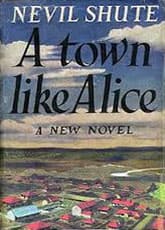A Town Like Alice
Critique • Quotes
 First edition
First editionFirst publication
1950
Literary form
Novel
Genres
Literary
Writing language
English
Author's country
England
Length
Approx. 92,000 words
Four stories in one
It takes Nevil Shute a long time in this novel to get to the town of Alice (Alice Springs actually), and even longer to get to the town like Alice. The building of a new town in Australia is only a minor part of A Town Like Alice, just the climax really of a very long story arc. Most of the novel doesn't even take place in Australia, but rather in England and Malaya.
In fact, this novel is more like a collection of stories, linked by the character of Jean Paget. First there's the story of how a London lawyer for the estate of a Scotsman tracks down his only heir, the aforesaid young Paget, introduces her to her some modest wealth and London culture, and quietly falls in love with her despite the disparity in their ages—without telling her or admitting it to himself.
Then there's the story she tells him of her experiences in the far east during the Second World War, when she was among a number of women taken prisoner by the Japanese and forced to tramp the countryside, with the story being capped by her return to Malaya after the war to help a small village that had taken the women in.
Next is her search for an Australian, Joe Harmon, who had sacrificed himself to save the women.
And finally we get her settlement in Australia and her work to create a livable town "like Alice".
Grittiest writing
Of these long episodes, the middle one of her experiences in Malaya is by far the most affecting. It's a story of great privation, death, cruelty and partially redeeming humanity, probably the grittiest writing Shute's ever done. Not coincidentally, Shute himself has said this is the only episode in a novel he has ever based on a real-life incident. And it's entirely engrossing—heart-rendingly engrossing. Its power is what lifts the entire work I believe—why this novel as a whole is one of Shute's most popular and lasting.
However, this part also makes the rest of the novel seem rather pallid by comparison. Before and after, Shute seems to be wandering, dabbling in a bit of characterization here and there, indulging in a poignant bit of drama now and then, without any clear purpose.
Now, Shute dabbles very well. His characters can be well drawn and his small dramas can entice for a while. But it's all of minor interest, it all lags a bit, until he brings Paget, with her tragic and inspiring history, back into the spotlight.
Even then, her postwar life doesn't rise to the previous heights or sink to the previous depths. If you get anything from this, it might be how those who went through the horrors of war later had to move on with their lives and find new challenges.
A lot of Shute novels are structured like this: a central kernel of great dramatic, suspenseful, engaging writing surrounded by meandering storylines and ordinary characters who enter and exit without making any enduring impression.
A Town Like Alice is a novel much like other Shute works, but one of his best.
— Eric
Critique • Quotes

